- Home
- Tamora Pierce
Briar's Book Page 10
Briar's Book Read online
Page 10
Briar, Sandry, and Tris looked at Daja, who shrugged. She had known of Frostpine’s reputation for a year, but had not chosen to speak of it much. Frostpine wanted to teach her: nothing else mattered.
Crane went on, “You four have the honor of studying with teachers of royal magnitude. How you could be ignorant of their stature—”
The young people looked down, embarrassed.
“Oh, cork it,” said Rosethorn, glaring at the man. “Don’t belabor the point. It happens we are the best teachers for their talents—that’s all they ever needed to know. If you have something really important to say, say it. I want to go back to bed.”
Crane spread his handkerchief on the table and fussed with it, folding it into a series of tiny pleats. After a moment he said quietly, “Very well. Here it is, with no flourishes: most of those sent to work with me are hopeless. I have no time to both teach them and uncover the nature of this disease. You know this work must be done quickly and accurately, by masters, not green students.”
“I’m so tired,” Rosethorn muttered. She looked up, meeting Crane’s eyes. “You don’t need me. You have a diagnosis oil; you must be halfway to a cure.”
“If I am, it is news to me,” replied Crane acidly. “Finding the oil was luck. As far as divining the heart of the disease, I have done test after test, without result.” He took a deep breath. “We have our differences, but you know—I would hope you know—that I respect your gifts and your knowledge. You are needed.”
Briar was uneasy, hearing so proud a man do what sounded too close to begging for comfort. He knew without even reaching out that the girls felt it too. He wanted to offer to help, but there was too much unpleasantness between him and Crane. In the man’s eyes he was a low-bred thief—Briar did steal the shakkan from Crane’s greenhouse—and in Briar’s experience Money-Bags like Crane never changed their minds about people like him.
“I’ll help.” Rosethorn looked at Crane. “You knew I would.”
Crane relaxed, giving something that sounded like a sigh of relief. “I thought you might want me to beg just a while longer.”
“Once they stop fussing, they really do well together,” Lark explained to the young people. With a glare at the other two adults she added, “They just have to get the fuss out of the way.”
“She has no system,” began Crane.
“He’d rather criticize how other people work,” added Rosethorn.
“You see what I mean,” Lark told the four.
“We’ve never handled a brand-new disease, though we know the theory,” Crane pointed out quietly. “Finding cures for the current manifestation of old diseases is our strongest area of expertise.”
“You tried all the procedures for known diseases?” Rosethorn asked suddenly. “The smallpox ones, and the measles ones? Just in case?”
Crane looked down his lofty nose. “You must be mistaking me for an apprentice,” he told her coolly. “It was the first thing I did.”
Rosethorn made a face. “All right. Speaking of apprentices—”
Crane looked at Briar. “No. Absolutely not.”
“Absolutely yes,” snapped Rosethorn as Briar glared at Crane. “You don’t have to work with him—”
“I don’t want him in my greenhouse.”
“He’s thorough, he does exactly what he’s told, and he has the steadiest hands of anyone in Winding Circle,” Rosethorn informed Crane.
Briar gaped at her. So much praise from Rosethorn was unnerving. Until the start of quarantine, he could count on his fingers the number of times she’d so much as said “Good job,” and still have plenty of fingers left.
Crane raised his brows. “I know he possesses steady hands. He is a pickpocket.”
“You’re in no position to refuse,” Rosethorn told him. “I need to know if he can do this. There are too few of us who have any aptitude for it. If he’s one, we’ll find out.”
Crane sighed, and looked at Briar. “Keep out of my way,” he warned, getting up.
Briar was about to spit on the floor to show his opinion of the man, but Rosethorn caught his eye. He didn’t need to mind-speak with her to see the warning in her face.
Lark put out a hand to delay Crane’s departure. “Sandry, the new masks and gloves.” Sandry darted into their workroom as Lark asked Crane, “How are you on the spelled robes and foot covers?”
“We have enough for tomorrow and the day after,” Crane replied. “I suppose we will need smaller ones, though, for the boy.” He said it without looking at Briar.
Sandry returned with a metal box. She squinted as she handed it to Crane; the other three turned their faces away from the blaze of magic coming from the protections on the box and from its contents.
“What’s the matter with them?” Crane wanted to know.
“They see magic,” explained Lark. “Don’t you?”
“No,” Crane admitted. “I have a visualization potion I use when I need to see it, but I confess, it makes my skin break out. Rosethorn?”
She sighed. “I know. Dawn. Get some sleep.”
Crane thanked Lark and walked out into the gray afternoon.
“I don’t like him,” Briar growled softly.
“You don’t have to,” said Rosethorn, getting to her feet with a yawn.
“I won’t do it,” retorted Briar. “I just won’t.”
Rosethorn lifted her own eyebrows, enough like Crane that Briar, who’d never seen a resemblance before now, blinked at her. “There are adult mages, rejoicing in great power and knowledge, who would kill for the chance to work for Dedicate Crane,” she informed him. Then her mouth twitched. “Of course, they don’t know him personally.”
Sandry giggled.
“It won’t kill either of us, though we may wish it had,” said Rosethorn. “I’m going back to bed. So should you—we’re due at the greenhouse first thing tomorrow.”
Briar, about to argue, choked. He had been inside the Air Temple’s greenhouse only once, to steal the shakkan. After that, he wasn’t even allowed to loiter near it, to glimpse at the unknown plant-treasures inside.
“Oh, didn’t I mention that?” asked Rosethorn, her voice a little too innocent. “Crane’s workroom is inside the greenhouse.” She sauntered into her room and closed the door.
“She must feel some better if she’s tormenting people,” said Lark, standing. “I’d better get to work.” She walked into her workroom. Sandry followed and closed the door as Tris and Daja gathered the dishes.
He splashed through the sewers in a pure white novice’s robe that was much too big for him. He wore nothing under it, and—to his shock and disgust—he was barefoot. His bare toes sank through inches of the kind of muck that made his guts crawl to think of it.
“Come on,” ordered Flick. He saw her clearly, though neither of them carried lamps. “We’ll miss your birthday party.” She was properly dressed in rags and shoddy boots, jigging in her eagerness to move along.
Briar muttered about not having a birthday, let alone a party, but he followed as quickly as the habit would allow. She was moving farther off down the pipe. “Wait up!” he called, trying to lift the habit’s skirts. Flick only laughed and ran on.
The tunnel bent around a corner. When he cleared it, Flick was nowhere in sight. “Hey!” he yelled. “Where’d you get to?”
Her laugh emerged from an opening several feet away. He followed the sound and saw Flick well ahead. “Wait!”
“Briar’s gettin’ slo-ow, Briar’s gettin’ slo-ow,” she taunted. He sighed. She had done this just before the Longnight holiday, when he’d followed her through a warren of streets in the worst part of the Mire. She’d almost given him the slip then, just as now. He wasn’t about to lose her, not down here.
The pipe shrank, forcing him to walk hunched over. With every step he took, she seemed to take three. “You got to slow down!” he cried.
“You got to speed up,” she retorted, and giggled.
“Will you just wait?”
he demanded. The filthy water rose, eddying around his calves, then his knees. It dragged on the habit, pulling him back.
“I can’t, Briar,” she said, voice somber. “I can’t wait, even if it is your birthday.”
“Flick!” he cried, battling water and habit to close with her. “Stop!”
The girl shrugged and ran off down the pipe. Briar watched in panic as she got farther and farther away. Something bad lay ahead. If he lost sight of her, it would be the end. He shucked the habit impatiently and pumped his suddenly weak legs, fighting to gain speed. He was too slow; she was too quick. She grew smaller and smaller.
“Flick!” he screamed, and she was gone. He was awake.
If his bed hadn’t been a mattress on the floor, he might have fallen out. Instead Briar thrashed his way out of the covers that tangled around him. Little Bear whined and licked sweat off the boy’s face. Panting, Briar sat out the shakes, clenching his hands as he remembered how he couldn’t hold Flick, not in a dream, not in Urda’s House. How could he have let her die, with all this magic to serve him? He didn’t try hard enough—if he had, Flick would be alive. He’d as good as killed her himself by not doing more.
Sandry came in, which was only to be expected. Her bedroom was across from his. In one open palm she carried her night lamp, the round, dirty stone that Briar, Tris, and Daja had spelled a year before to hold light for her. Sandry was afraid of the dark. On nights like this, Briar didn’t blame her in the least.
She sat next to him on the mattress, her white nightdress billowing. Her stone lamp went on the floor in front of them.
After a moment Briar whispered, “Maybe I should pick yesterday for a birthday. The day Flick—died.”
“Whatever for?” asked Sandry quietly. “Birthdays are supposed to be happy days.”
“But then I’d be remembering her, right? She wouldn’t be dead, if I remembered her on my birthday. It wouldn’t be so bad that—that I let her go.”
“That isn’t the way to remember her, Briar,” Sandry told him gravely, sounding as kind and wise as Lark. “She wouldn’t like it.”
Briar shook his head. “How would you know what she’d like and what she wouldn’t?”
Sandry rubbed her hand over his hair. “Because no one who’s truly your friend would want you to feel bad for knowing them.”
That struck home. He would need to think it over, of course, but he had the sense that she was in the right of it.
Daja arrived next, a lit incense stick in her fingers. It gave off fragrant, rose-scented smoke as she waved it in each corner, chasing out bad air as Traders did for nightmares. Once finished, she sat crosslegged on the floor, putting the incense in a little holder beside the lamp.
Last of all came Tris, a black crocheted shawl over her nightgown. On one forefinger she carried a ruffled bird that blinked sleepily. The other three stared at the bird in wonder. The summer before they had helped Tris raise a young starling named Shriek. In the autumn, after their return from a trip to northern Emelan, Shriek had taken wing with a flock of other starlings, headed south. Since no other birds of his kind came near humans, they had to believe this was Shriek, back after months away.
Tris held the starling out to Briar. He took the bird gently as Tris sat, fussing with her nightgown and shawl until they were arranged to her satisfaction. When Briar returned her starling, Shriek trundled up her arm and into her unruly curls, where he promptly went back to sleep. Little Bear settled too, warming Briar’s back. The four remained silent, thinking their own thoughts, as the night slowly wound down.
If Rosethorn had any thoughts when she entered Briar’s room before dawn and found all four of her charges sleeping there, she kept them to herself. Instead she woke the boy without disturbing the others and signaled that he’d better get ready to go.
Air Temple services were held at dawn. Soon after the hymns of greeting to the sun ended, Crane and a company of young men and women in Air yellow, Water blue, or novice white came to the greenhouse door where Rosethorn and Briar waited. Briar squinted at Crane’s following. Every one of them sported a large crimson dot on the forehead, to tell the world they didn’t have blue pox. He was also curious. Didn’t Crane say he had no help just the day before? Who were these people, then?
“Rosethorn,” Crane said. He looked at Briar and sniffed, then unlocked the door. It opened into a third of the greenhouse Briar had never seen, hidden behind drapes on its glass walls. “Osprey, show the boy our clean-up procedures. Make sure he is thorough. Then take him around.” To the Water dedicate and Rosethorn, Crane said, “It will be some time before the cleansing and robing rooms are clear. I have tea waiting in my office.”
Osprey, Crane’s yellow-robed apprentice, was a full-figured young woman with curly black hair. She sized Briar up through eyes a darker shade of green than his own, nodded, and jerked her head at the door. Briar followed, as did all of the other workers.
The men actually showed him the scrubbing procedure, since the women cleaned up in a separate cubicle. It worked much like the bath in the tent the day before, which was almost comforting. Briar recognized medicinal herbs and oils in the rinses as well as the soaps, ones he knew well. Better still, this washroom was warmer than the tent had been. As the sun’s early rays struck the high glass walls over the shrouding drapes, the whole building began to heat up.
Once they were clean, Briar and the young men donned treated caps, robes, masks, gloves, stockings that tied over the knee, and slippers. Everything in the boy’s size lay under a slate with his name chalked on it. Once more he got a sense of Lark and Sandry in all that he put on. It gave him heart, as it had done in Urda’s House.
“I don’t envy this lad,” a young man commented. “He has to work in the Master’s private workroom.”
“Don’t get comfortable,” advised another man, tying on his mask. “Nobody lured into his lordship’s private lair has lasted a whole day. Some of us outer workroom slaves have endured a week or more.”
They led him into a big room fitted with cabinets, braziers, counters, water kettles, and a vast tub that held steaming water by a glass wall. Once he had adjusted to the glitter of magic that lay over it all, and the heavy scent of cleansing oils and washes, Briar was fascinated. All the floors and walls were hard-glazed tile or marble except for the longest glass wall and the ceiling. When Briar knelt to inspect a drain in the floor, a youth said, “Every night when we’re gone, they fill both the inner and the outer workrooms with steam. It carries special chemicals and oils, to purify everything. All our cabinets are tight-fitted to keep water out, and we leave the glass and porcelain on the counters to be cleansed. It costs, but his Lordship dedicated his personal fortune to this greenhouse.”
Osprey told Briar who everyone was, pointing to each as she gave the name. “No sense in memorizing them, though,” she said, her black-fringed green eyes dancing over her mask. “Most of them will be gone in a few days.”
“Please, gods,” chorused her crew. They were laying out bottles, trays, measuring spoons, and countless other mysterious objects Briar couldn’t name.
“When he ejects you from the inner workroom, come have supper with us at the Table of the Useless in the dining hall,” suggested a man called Acacia. “There’s what, twenty now? We had to move two tables together last night.”
Briar stared at them. He felt as if he’d been magically transported to a foreign land where he spoke none of the language. One day ago he’d been trapped in a damp, gloomy house where people raved in fever dreams and those who cared for them did so in tight-lipped silence. Now he was in a room filled with light, air, and warmth, among people who joked as if the blue pox were inconvenient, as if there were life away from sickbeds and the biting scent of willowbark tea. Only when he noted the speed at which they worked, writing labels, filling bottles and jars, loading wire racks with glassware, scrubbing, mincing bundles of herbs, did he think these people knew that things were desperate at Urda’s House and the ot
her infirmaries.
At a wall beside an open doorway—to Crane’s “lair,” he assumed—two gloved, robed, and masked figures labored in silence. Briar moved close to watch as they drew liquid through narrow holes in sealed jars, dripping it into inch-deep wells in a thick crystal plate.
“They have the scary job,” Osprey said quietly in Briar’s ear. When he looked at her, she explained, “They infuse the disease in those jars. The samples we get”—she pointed to stacks of familiar-looking metal boxes near the two silent workers—”are steeped in a special liquid. It draws out the essence of the disease, then fades. Only the blue pox remains. Samples from each patient go into a row of seven wells, three such rows to a tray. That goes into the other workroom for his lordship to play with. Out here we all handle the disease. People tire quickly on that task, and we don’t dare make any mistakes. Our robes aren’t airtight. One little droplet would be deadly.”
“They dish out blue pox?” whispered Briar, not sure he’d understood her properly.
“It’s not the pox that kills people, you know,” said Osprey, watching the pair as intently as Briar. “It’s the fever that comes with it.”
“I know,” he replied bleakly.
Osprey glanced at him. “Wait—didn’t someone tell me it was you and Dedicate Rosethorn—? At Urda’s House?”
Briar nodded. Slowly he walked over until he could see the liquid as it was poured. This was the enemy that killed Flick, drooling in pale gold strings from tiny glass ladles.
“Come on,” Osprey said when he moved away from the jars. “Here’s the inner workroom.” She motioned toward the open doorway next to the blue pox workers.
If the outer workroom was grand, the inner was enough to stagger a boy from Deadman’s District, once he could see through the blaze of magic that shone everywhere. Two walls were entirely glass; two were covered with valuable procelain tiles that reached from the marble floor to the glass roof. Long counters ran down both glass walls and a third of the longer tiled wall. Every other inch of wall space, even under the counters, held watertight cabinets. Only the tall cabinets against the long tiled wall had no doors. On their shelves rested the crystal trays used for blue pox samples.

 Lady Knight
Lady Knight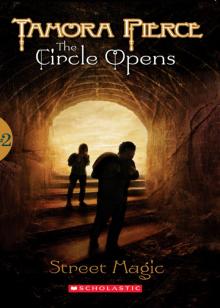 Street Magic
Street Magic Bloodhound
Bloodhound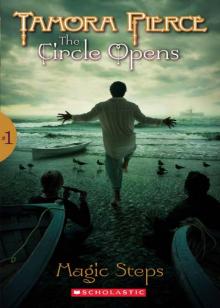 Magic Steps
Magic Steps Alanna: The First Adventure
Alanna: The First Adventure Emperor Mage
Emperor Mage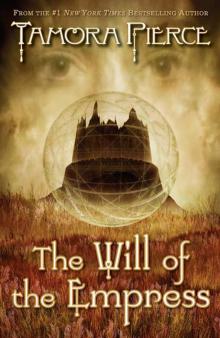 The Will of the Empress
The Will of the Empress The Realms of the Gods
The Realms of the Gods In the Hand of the Goddess
In the Hand of the Goddess Tris's Book
Tris's Book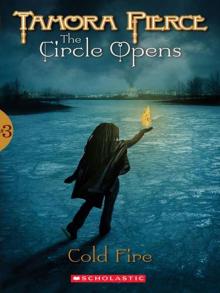 Cold Fire
Cold Fire Sandry's Book
Sandry's Book Wild Magic
Wild Magic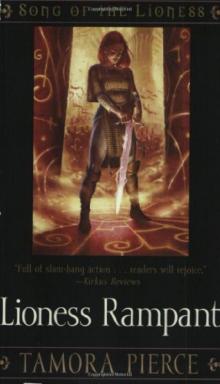 Lioness Rampant
Lioness Rampant The Woman Who Rides Like a Man
The Woman Who Rides Like a Man First Test
First Test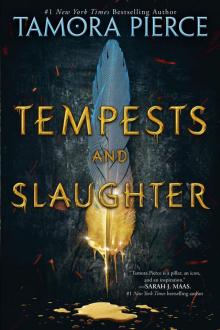 Tempests and Slaughter
Tempests and Slaughter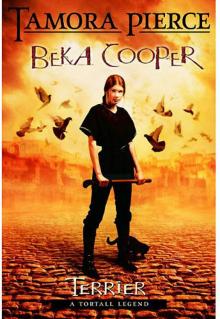 Terrier
Terrier Trickster's Queen
Trickster's Queen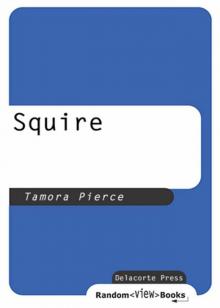 Squire
Squire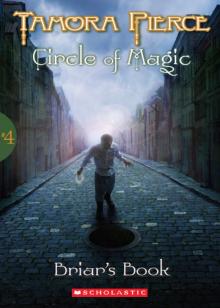 Briar's Book
Briar's Book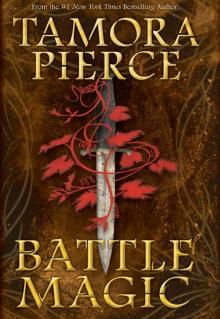 Battle Magic
Battle Magic Page
Page Melting Stones
Melting Stones Wolf-Speaker
Wolf-Speaker Mastiff
Mastiff The Song Of The Lioness Quartet #1 - Alanna - The First Adventure
The Song Of The Lioness Quartet #1 - Alanna - The First Adventure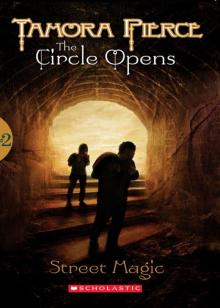 The Circle Opens #2: Street Magic: Street Magic - Reissue
The Circle Opens #2: Street Magic: Street Magic - Reissue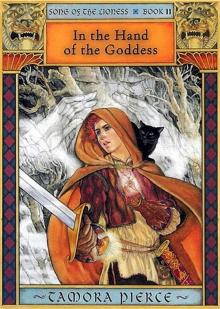 Tortall 1 - Song Of The Lioness #2 - In The Hand of the Goddess
Tortall 1 - Song Of The Lioness #2 - In The Hand of the Goddess Protector of the Small Quartet
Protector of the Small Quartet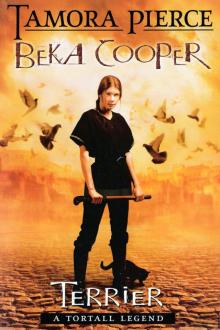 Beka Cooper 1 - Terrier
Beka Cooper 1 - Terrier Alanna
Alanna Trickster's Choice
Trickster's Choice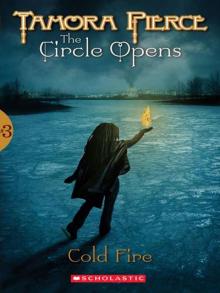 Circle Opens #03: Cold Fire
Circle Opens #03: Cold Fire In the Hand of the Goddess (The Song of the Lioness)
In the Hand of the Goddess (The Song of the Lioness)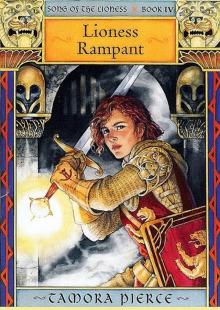 Song of the Lioness #4 - Lioness Rampant
Song of the Lioness #4 - Lioness Rampant Young Warriors
Young Warriors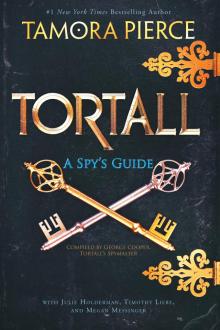 Tortall
Tortall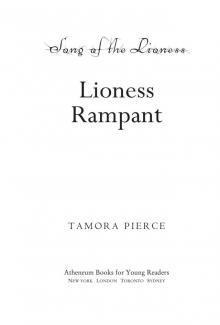 Lioness Rampant (Song of the Lioness)
Lioness Rampant (Song of the Lioness) Melting Stones (Circle Reforged)
Melting Stones (Circle Reforged)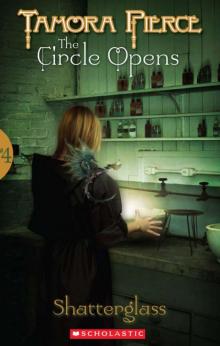 The Circle Opens #4: Shatterglass
The Circle Opens #4: Shatterglass